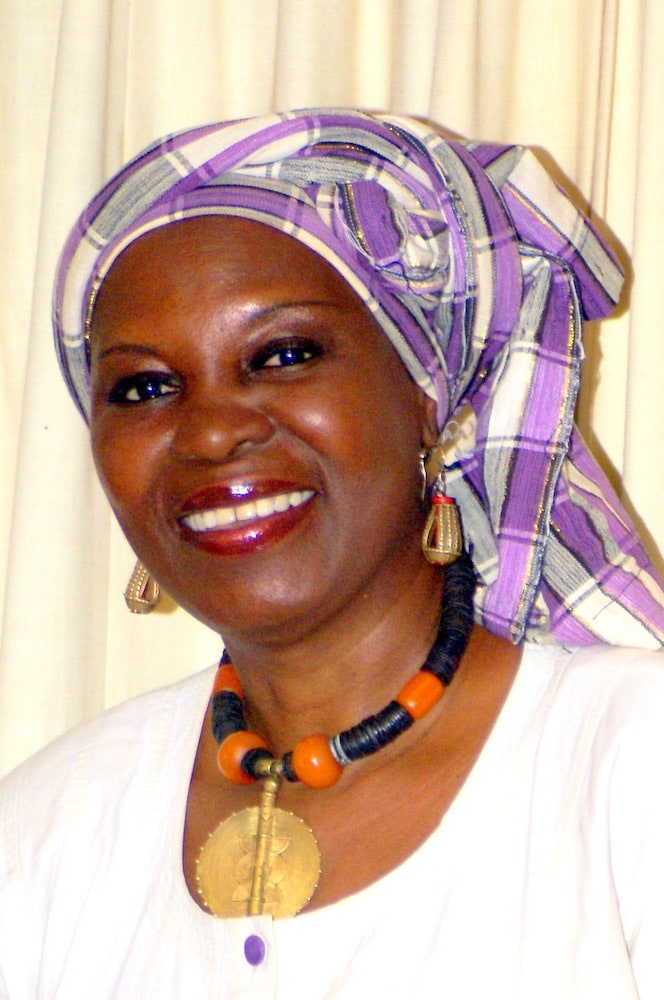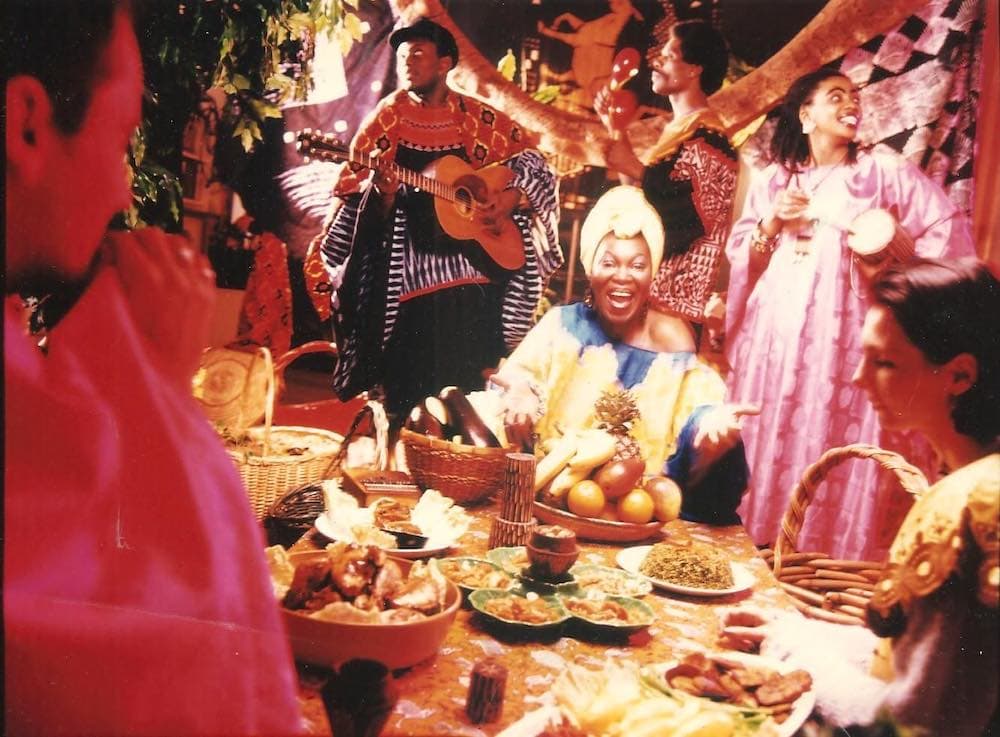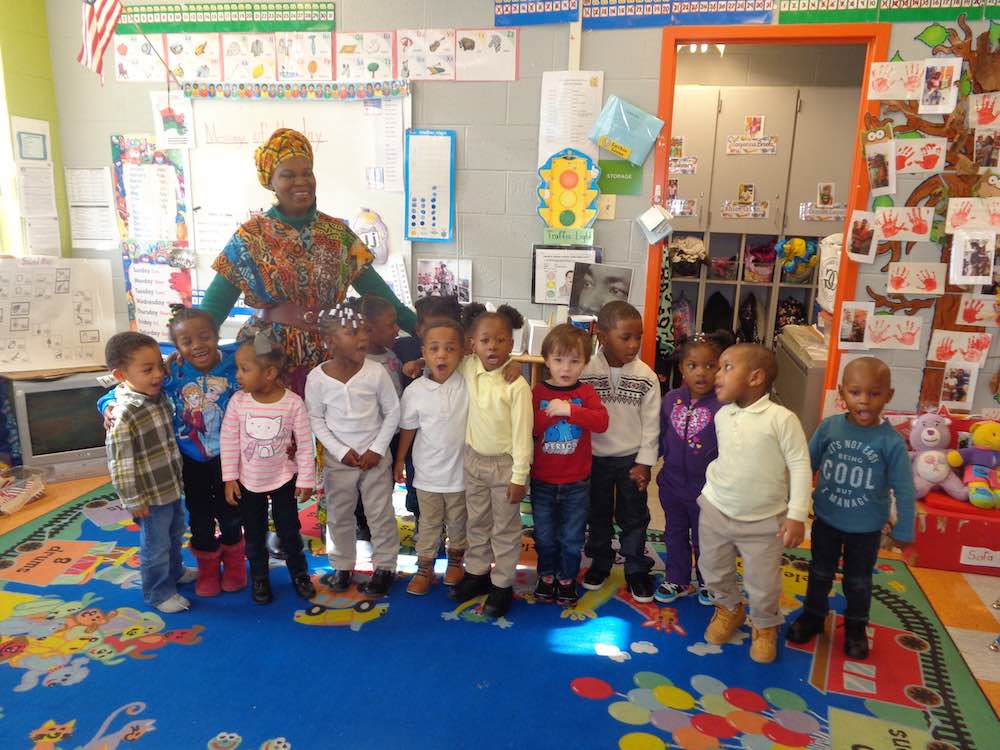palaver (noun) –
– a long parley usually between persons of different cultures or levels of sophistication.
– unnecessarily elaborate or complex procedure.
HISTORICAL
– an improvised conference between two groups, typically those without a shared language or culture.
Ask Vera Oyé Yaa-Anna about palaver, and she has a very different explanation for this word. “Palaver is a Portuguese word from palavra, which means to chat or to talk. It’s about having a dialogue with diverse people.”
Born and raised in Liberia, Oyé Yaa-Anna explained how palaver has a very specific meaning integral to Africans. “Throughout West Africa, you have a place called the palaver hut,” she said. “It’s a small gazebo-like [structure] that … people use as a meeting place, like city hall. It’s where the elders come to listen to disputes and where people can come and settle them. It’s also where people come and be entertained.”

A storyteller, educator, producer, and maternal figure, Oyé Yaa-Anna recognized a need for bringing aspects of her African culture to youngsters and adults in the Washington, DC, region as a means to both mend broken communities and share creative experiences in story, music, dance, and cooking. The driving force behind the small, nonprofit educational performance company Oyé Palaver Hut, Auntie Oyé — as she is fondly known by her acolytes, both young and old — is a one-woman, one-stop operation. With her hair wrapped in a vibrant blue printed African headscarf, she exudes happiness with a warm smile and laughing eyes.
An Oyé Palaver Hut program typically feels like a village event or a town hall with multiple components — drumming, dance, storytelling, and, frequently, food. Imagine sitting in an open-air gazebo-like hut that’s a corner coffee shop, music hall, and dance floor in one, where stories and sustenance are shared among friends and among friends you haven’t met yet.

Auntie Oyé cites her own family history as an inspiration for creating Oyé Palaver Hut. “My great-grandparents were Americans,” she said. “My great-grandmother came from Richmond, Virginia; my great-grandfather came from Georgia. I also have a beautiful icon who is my ancestor: Harriett Tubman.” Her great-grandparents belonged to the American Colonization Society, which in the 19th century worked to return Africans to Africa to escape the horrors of slavery and racism. Liberia was one of the few uncolonized spots on the continent. “The reason it wasn’t colonized was because of the mosquitoes,” Auntie Oyé laughed. “They were just there by themselves …. I thought, those people must have really wanted their freedom; they didn’t care where they went as long as it wasn’t the plantation.” That, she added, indicated how horrific slavery was in America.
Sharing personal and family histories is essential to what Oyé Yaa-Anna does through her workshops and performances. She explains: “Growing up in Liberia, we have strong values. Number one, you own your story. We start at three years old. [Each child] gets up and introduces themself, ‘My name is …’ Then says, ‘Once upon a time,’ you can tell the story if you want. If you don’t, you just say, ‘The end.’ Everybody claps. And that’s how we build self-esteem.”
She also inculcates respect for elders in her young students, whom she meets at in-school and after-school programs across the District and beyond. “In Africa,” Oyé Yaa-Anna said, “we revere our ancestors and remember our culture. I live that every day because I dress as an African woman every day; I don’t want anybody to forget where I came from.”
She produces programs focusing on music and dance with some of the master African performing artists based in the region, including P.G. County–based drummer Joseph Soh Ngwa, Malian musician Chieck Hamala Diabate, DC-based African dancer and drummer Sylvia Souma, and dancer Dianne Freeman, among others. These programs approach the African arts as holistic and intersectional, encompassing music, dance, storytelling, and food. Auntie Oyé serves as a griot, introducing each component of her program with a story, a lesson, or a tidbit that connects African culture and American culture to the artists on stage.
For example, the West African djembe drum serves as a conduit — as youth learn traditional drum methods and rhythms, they begin to make the connection between African music and African American music, from spirituals to rock and roll, blues, jazz, soul, hip hop, and rap. Oyé Palaver Hut’s senior citizen programs rely, too, on traditional drumming techniques and the proven medical research that indicates drumming decreases stress, decelerates anxiety, enhances immunity, and rhythmic cues improve dexterity, strengthen memory and concentration, lower blood pressure, and release endorphins in the brain that promote better health.
Some classes and workshops focus on a single art form — drumming, for example, or cooking, or storytelling — while other programs might be more performative and holistic incorporating drumming, dancing, and storytelling. To learn more about how to sign up a child — or yourself — for a workshop, visit the calendar on the website. Some may be a single-day workshop, others may meet for a specific session.

Oyé Palaver Hut has been around in one form or another since 1993. Oyé Yaa-Anna came to DC in 2003 and saw a need here. Oyé Palaver Hut is a registered nonprofit, even if it is primarily a one-woman shop. Oyé Yaa-Anna says the organization receives some funding from DC Public Schools, private foundations, and individuals. PTAs and schools hire her for programming, but they can’t always afford a full cohort of performers; Oyé Yaa-Anna, of course, pays her drummers, dancers, and other performers. She would like to do more — offer more programs and more schools and community centers, as well as private paid events. “I’m just one person — I’m executive director, shopper, producer, teacher — and sometimes someone says, ‘Can’t you go call somebody else [for help]?’ I want to train more people to do this, but it takes money,” she said, “and I don’t have money to do it all.”
That said, she approaches each day with a smile and gladness in her heart, saying, “I’m fortunate that I came from a culture where they told me the history so nobody can put me down or make me feel bad. I may not have the [consumerist] trappings of success, but I know who I am.” And children who spend time in her programs will grow up knowing more about themselves.
For more information about Oyé Palaver Hut and to donate, visit oyepalaverhut.org/.
About the Wendi Winters Memorial Series: DC Theater Arts has partnered with the Wendi Winters Memorial Foundation to honor the life and work of Wendi Winters, the DC Theater Arts writer who died in the Capital Gazette shooting in Annapolis, Maryland, on June 28, 2018. To honor Wendi’s legacy, the Wendi Winters Memorial Foundation has funded the Wendi Winters Memorial Series, monthly articles to be produced by DC Theater Arts to bring attention to theater companies and theater practitioners in our region who engage in exemplary work that makes our community a better place. The centerpiece of these articles is a series we are calling “The Companies We Keep,” articles offering an in-depth look at one local theater company each month. In these times of division and conflict, DC Theater Arts chooses to celebrate those who do good.
For more information on DC Theater Arts’ Wendi Winters Memorial Series, check out this article graciously published by our friends at District Fray Magazine.





